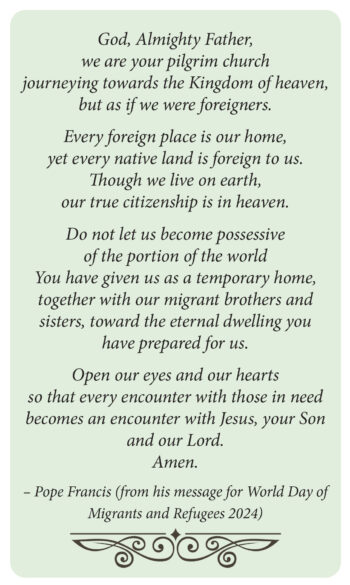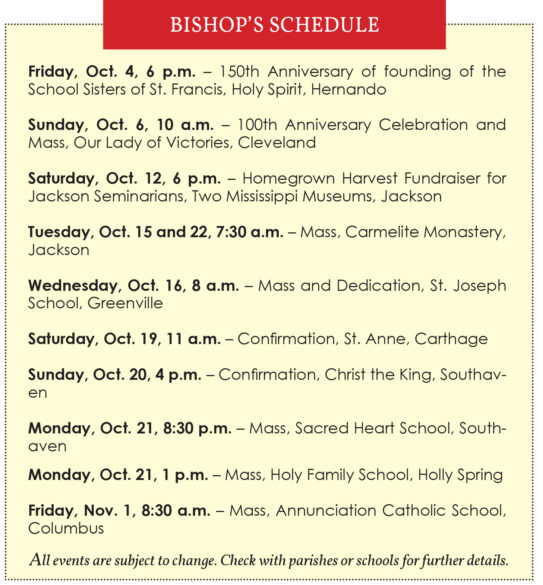By Bishop Joseph R. Kopacz, D.D.
From the center of our church and from the heart of Jesus Christ, each year for the past 110, a succession of popes in an unbroken chain beginning with Benedict XV in 1914 and continuing with Pope Francis in 2024, have dedicated a World Day of Migrants and Refugees. Historically, it was the agonizing impact of World War I that brought about the beginning of this worthy commemoration.

In addition to the death of millions of combatants and civilians on the European continent, millions were displaced and fled from their beloved homelands. War is evil, and in every generation, it is one of the most obvious reasons that incites forced migration, a tragedy in our time that is being played out in the Ukraine, the Middle East, and in several African nations to name but a few. There are other causes. Deep-rooted poverty and natural disasters, often linked, famine, overwhelming violence from cartels and unbridled corruption are significant factors that also fan the flames of migration.
The church throughout the world is serving and suffering in these harsh realities. Reflecting on the mysteries of the Kingdom of God as is our spiritual nature, Oct. 19, 2023 marked the conclusion of the First Session of the XVI Ordinary General Assembly of the Synod of Bishops. The following are some selections from Pope Francis’ statement on this year’s commemoration. “Emphasizing the synodal dimension allows the church to rediscover its itinerant nature as the People of God journeying through history on pilgrimage, ‘migrating,’ we could say, toward the Kingdom of Heaven … Likewise, it is possible to see in the migrants of our time, as in those of every age, a living image of God’s people on their way to the eternal homeland. Their journeys of hope remind us that ‘our citizenship is in heaven, and it is from there that we are expecting a Savior, the Lord Jesus Christ.’” (Phil 3:20) For this reason, the encounter with the migrant, as with every brother and sister in need, is also an encounter with Christ. He himself said so. Every encounter along the way represents an opportunity to meet the Lord; it is an occasion charged with salvation, because Jesus is present in the sister or brother in need of our help. In this sense, the poor save us, because they enable us to encounter the face of the Lord.”

The following is but one traumatic event in the tragic story of forced migration. Awakened in the dark of night, José’s mother told him to leave and head north to stay with his aunt who lived thousands of miles away in another country. It was not that she wanted him to go, her heart shattered with the very prospect of his departure, but ongoing threats from gangs and drug cartels in the neighborhood where they lived anticipated his death if he stayed. She would join him soon, she promised, for remaining might guarantee her the same fate if they found that she had sent him away.
Such stories could be multiplied almost endlessly and told with any number of variations with respect to their details. People like José come to this country as a stranger, often with no family ties, no friends, and just with the hope that they might find a place of safety. We know that vulnerability suffuses the worlds of refugees, migrants and immigrants, but good news is also part of the story.
Whether we look at migration and immigration pragmatically, or through the lens of the Gospel our nation has enabled many to flourish who have arrived by air, water or land. In return, we are a nation rich in diversity, flourishing from the labors of so many strangers.
The World Day of Migration and Refugees challenges us to build upon the blessings that abound with the movement of peoples, while addressing the burdens and challenges in a manner worthy of our calling as the Lord’s disciples. It matters what we think, how we speak, and the way we respond to the strangers in our midst. God walks with his people, all of us.

